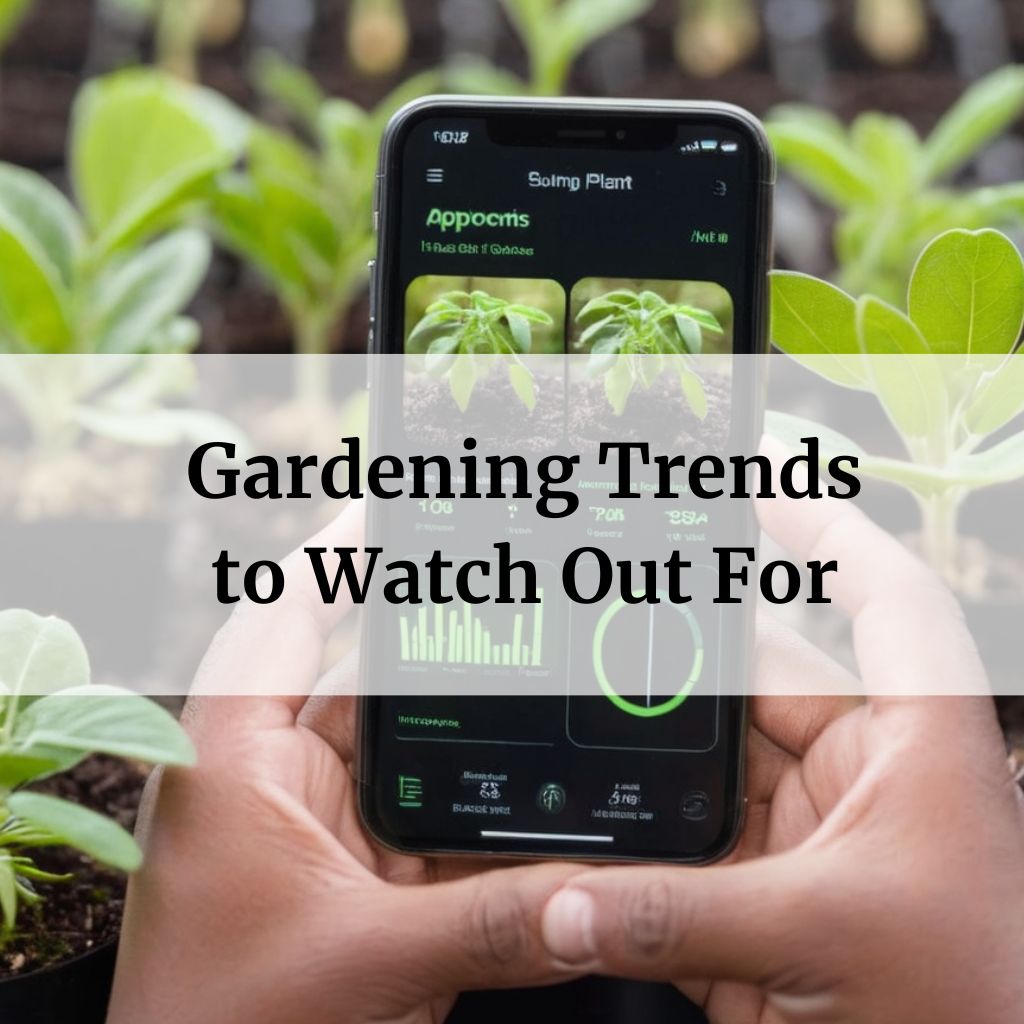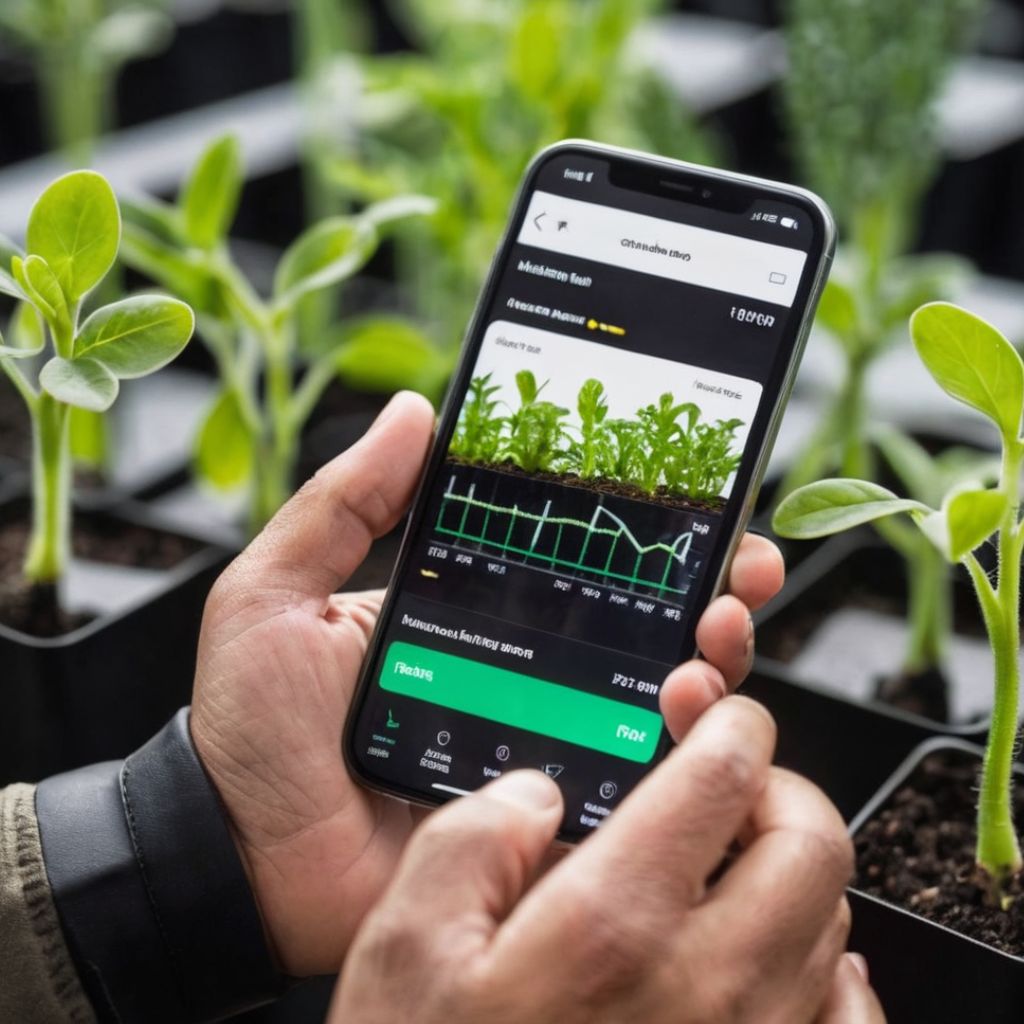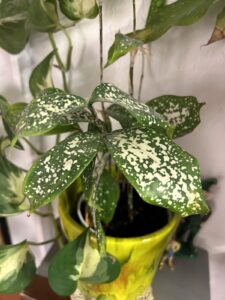
Gardening trends come and go, but some are definitely here to stay. As we head into 2024, several developments from recent years will continue to shape how folks cultivate plants both inside homes and within communities.
Key takeaways:
| Topic | Trends |
|---|---|
| Smart Gardening | According to gov.uk, minimalist and sustainable gardening is a growing trend in 2023 and 2024. |
| Sustainable Gardening | In a 2022 report by Garden Design, 62% of gardeners prioritized sustainable gardening practices. |
| Community Gardening | A 2021 report by the National Gardening Association found that 32% of U.S. gardeners participated in community gardening initiatives. |
| Urban Gardening Initiatives | A 2022 report by the National Gardening Association found that 40% of U.S. gardeners were involved in urban gardening and vertical gardens. |
Let’s explore some key movements to keep an eye on over the next couple years.
In this article
Smart Gardening

Automation and data-driven methods will no doubt progress further in “smart gardening.”
Early adopters have already gotten their hands on internet-connected soil moisture sensors, automatic watering systems, and monitoring cameras controlled from smartphones. We expect these smart devices to become even more widely available and affordable in 2024.
Gardening software and apps will also integrate more sophisticated algorithms. AI image recognition tools may be able to identify plant species, gauge growth stages, and detect early signs of pests or disease. Subscribers gain personalized insights into each plant’s individual conditions and needs. Though concerns over data privacy persist, the prospect of “gardening on autopilot” could be tempting for busy folks.
More compact, inexpensive smart grow systems designed for indoor use will hit the market. Seed starter kits, countertop herb towers, and plug-and-play hydroponic setups under WiFi-enabled grow lights aim to make the process virtually foolproof.
Still, some purists argue that high-tech gear risks substituting human intuition with simplistic software scripts. Maintaining a hands-on approach remains most rewarding to many gardeners.
Electromagnetic Gardening
The electrogardening gardening, sometimes also called electroculture, uses electricity to promote healthy plant growth. Electromagnetic gardening is a relatively new and little-recognized method and the idea behind electromagnetic gardening is that electrical currents and fields can be beneficial to plants in a variety of ways because they are sensitive to them.
Research has demonstrated that electrical currents can promote plant growth, raise seed germination rates, and improve nutrient uptake effectiveness. However, using electromagnetic fields for plant growth has not gained widespread acceptance or adoption, and the complexity and variability of electromagnetic fields make it challenging to establish standards.
According to a 2021 report by The Gardens Trust, the concept of electromagnetic gardening was first introduced more than 120 years ago, in a paper that explained the rapid germination of electrified seeds.
A new study out of the Chinese Academy of Sciences in Beijing has brought the idea back to life. However, some scientists believe that the basis of the hypothesis is poorly supported based on the current evidence.
Sustainable Gardening
As concerns over the environmental impact of industrial agriculture intensify, sustainable options became increasingly mainstream. Many dedicated homesteaders and community gardeners have long embraced permaculture strategies like companion planting, maintaining biodiversity, maximizing sun exposure, composting food scraps and mulching. But in 2024, even casual urban gardeners will seek ways to shrink their footprint and support local ecosystems.
Composting food waste and fallen leaves rather than sending them to landfills can help close nutrient cycles.
Water conservation techniques such as rain barrels, mulch and drip irrigation gain more traction as drought conditions spread.
Many municipalities promote pollinator-friendly native plants and natural habitat preservation on public and private plots.
Choosing organic, non-GMO seeds and transplants avoids harmful chemical residues. Overall, working with nature’s rhythms in sustainable food production appeals to younger generations.
Community Gardening
Community gardening found renewed popularity during the pandemic’s isolation as a way for neighbors to safely socialize outdoors. This growing movement looks here to stay in 2024, with more municipalities designating public land parcels.
Community supported agriculture programs directly linking urban consumers to nearby farms blossomed at the same time. Now various sharing economies centered around collectively cultivating and enjoying regionally-grown produce show no signs of slowing down.
School, faith-based organization and retirement home gardens providing educational programs and intergenerational activities will spread further.
Some enterprising startups host tool-lending libraries, seed exchanges and educational workshops open to all.
As healthcare costs rise, preventative communal gardening offers physical exercise and nutrition along mental benefits – strengthening ties between community members young and old. Active participation and sharing local agricultural knowledge helps sustain these initiatives.
Urban Gardening Initiatives
The rise in urban gardening can be attributed to several factors:
- Increased interest in sustainable living and a connection to nature in urban environments.
- Limited outdoor space in cities, making urban gardening an efficient way to grow food.
- The ability to share knowledge and experiences with others on social media platforms, such as Instagram, where there are over 2.119 million urban gardening posts
In 2024, innovative structures like vertical garden walls, green roofs and container farms will crop up creative spaces.
Rooftop beekeeping may gain official approval in more urban centers.
Some argue bringing food production directly into dense areas combats ‘food deserts‘ lacking affordable healthy options. Not to mention reclaiming blighted lots from illegal dumping or criminal activity provides a safe community hub.
Edible landscaping demonstration projects outside government buildings set an eco-friendly example.
Guerilla gardeners covertly green vacant parcels while petitioning local leaders for their legal protection.
Educational signage informing passersby expands environmental awareness. But critics note food safety compliance issues with urban soil contamination, and question impacts on residential property values.
Still, with political will, strategic small-scale cultivation can supplement local diets and beautify neighborhoods – especially as real estate costs squeeze out traditional backyard spaces.
In conclusion
Gardening continues to evolve alongside technological and societal changes. While automation and data-driven techniques aim to simplify the process, hands-on growing nurtures important real-world skills and connects communities.
Sustainable methods addressing environmental preservation gain favor as climate impacts intensify.
Resourceful urban initiatives green underused spaces and strengthen local food systems.
Going forward, both casual household gardeners and dedicated agriculturalists will likely adopt new techniques that balance high-tech conveniences with natural harmony.
Regardless of specific trends, cultivating plants remains a means of relaxing refuge, nutrition, education, and environmental stewardship for countless individuals and groups.
With ongoing experimentation and sharing of ideas, the future of indoor and community gardening appears bright as growing interest fosters vibrant, resilient landscapes and social networks everywhere.







